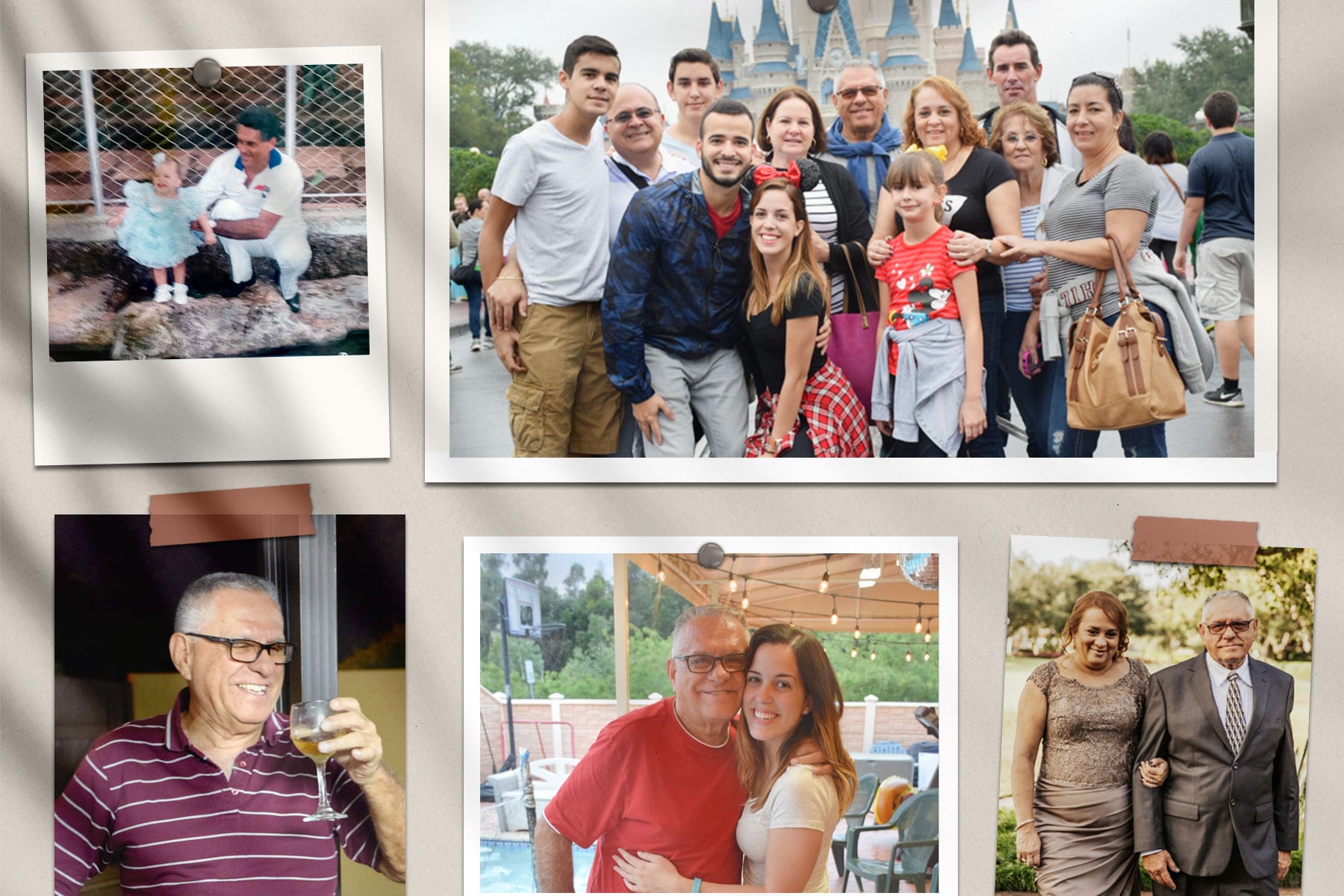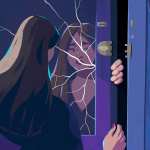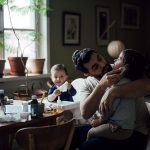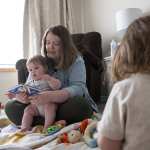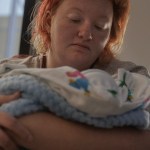The brightness outside was almost offensive.
In the somber, dim light of the intensive care unit, it felt like the virus had finally swallowed us whole. There couldn’t be anything left after that. Yet, outside the hospital, the traffic roared and the afternoon wore on. I squinted at the light through swollen eyes and tried to move forward, but everything was happening so slowly. I felt my husband put his hand on my back, keeping me steady as we approached the parking lot.
People walking into the emergency room at Kendall Regional Hospital in Miami that day looked at us, lines of confusion drawn on their foreheads. I had ripped an N95 mask off and thrown it into a bin moments before, and I knew its imprint still marked my face. What else could they see there? Did they know what we’d just seen? Could they tell?
We had just taken my grandfather off a ventilator. His last gasped breath reminded me of the moment, five years earlier, when I had watched my grandmother do the same in my living room after many months of cancer. There was something oddly reassuring that I could recognize that particular sound. That I could be sure, after those excruciating moments after he was extubated, that this was it. That it was done.
The unifying quality of death.
In the weeks since January 15 — one of the worst days of coronavirus death so far in the United States — I have often thought about our great communal loss. When my grandmother died, few of my contemporaries had understood the crushing weight of that grief — she wasn’t supposed to go so soon. But now, as I scroll through my phone, I see photo after photo of abuelos and abuelas my friends lost, too. Others couldn’t see what I carried after her death. Has this past year changed that?
I think now that maybe the people walking into the hospital that day could have known what was written on our faces. The chances are good, after all. There are over 500,000 dead, but how many millions of other lives have been touched by that loss?
I’ve spent the bulk of the past year reporting on and talking to people who were economically devastated by coronavirus. In the first months of the pandemic, I stayed up until the early hours of the morning answering hundreds emails about accessing unemployment insurance. It wasn’t long before the calls were tinged with stories of personal sickness and personal loss. Meanwhile, my husband, Manny, was seeing those patients in the intensive care unit he works in.
There was no part of our day that offered any respite from the virus. The virus became our lives.
Our first scare came in April when Manny arrived home early from his shift at Osceola Regional, a hospital in an Orlando suburb. I was standing by our kitchen island when he said he hadn’t been feeling well. Headache, cough; he had to get tested, couldn’t go back to work.
I put my hand on the counter for support. In the same way we recoil in fear, my body had manifested this blow.
At that point, we knew little about the virus. We were reusing each of our precious N95s and the laundry piled high. Manny would strip down to his underwear outside our door every day before walking in and chucking his scrubs into a bag to be cleaned.
We were still having parades for health care workers then, and whenever I drove by, taking in the police sirens and families waving flags and handmade posters, I felt a flash of pride. But my predominant feeling was fear. We kept hearing that younger people could manage the virus better, but my refrain then was that I didn’t want my family to test whether that was true.
Manny was tested twice that week and came back negative each time. He had been on a relentless night shift schedule before switching to the ICU on what at that point had been one of the worst weeks for the virus in Florida. His sickness wasn’t COVID, it was exhaustion.
He was only out for four days and back in the hospital before I could really savor the relief.
As the year went on, COVID crept in closer. A friend of a friend got it. A cousin. One of my mom’s coworkers. I spent so much time on the phone with our parents in those early months, trying to make sure they remained just as scared as we were. I listened for any sign of complacency, any signal that their patience was waning.
“I wouldn’t worry about your grandpa,” my mom told me early on. “He’s taking it more seriously than any of us.” I knew she was right. Of all of the anxieties I had back then, I didn’t worry about Grandpa much.
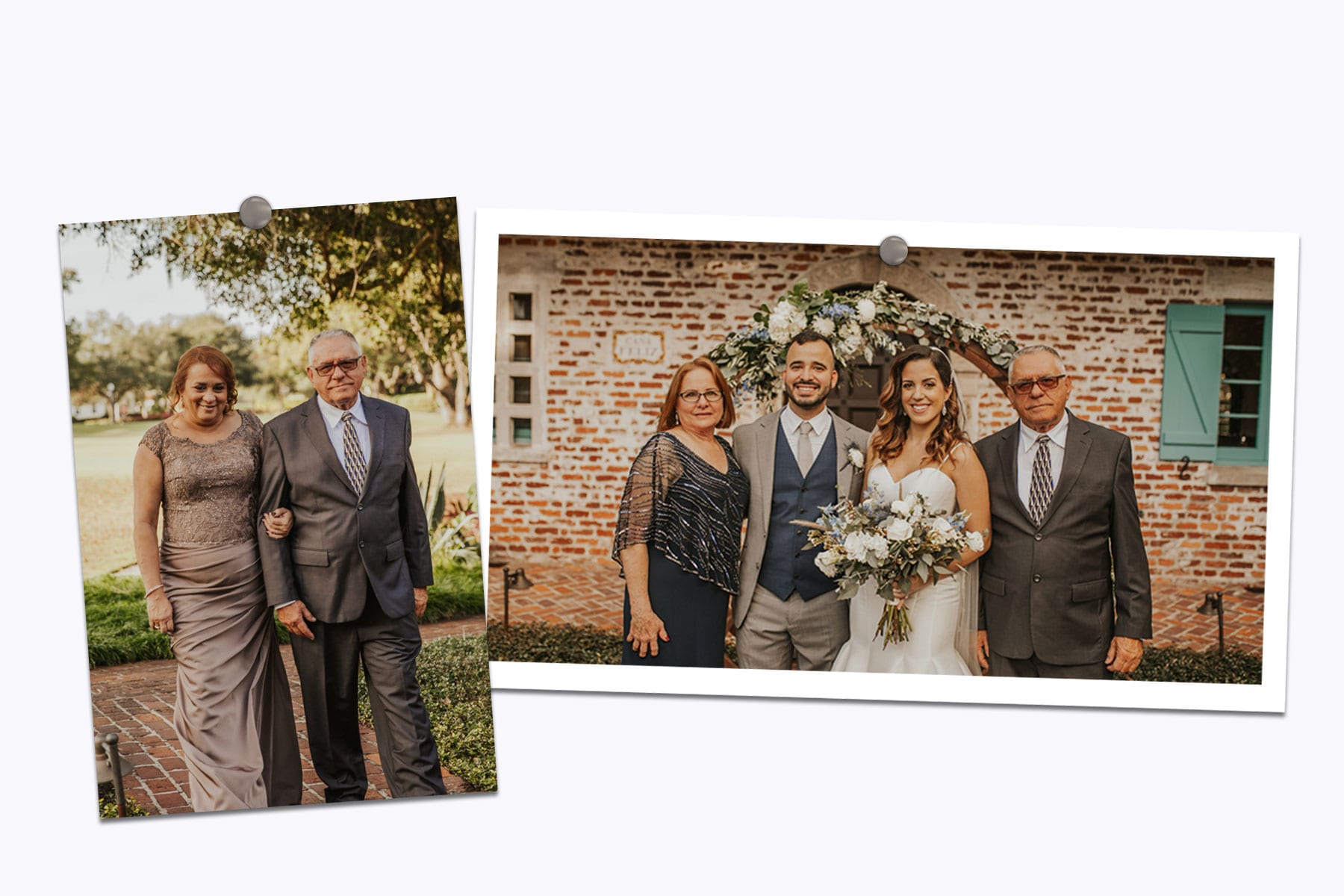
My grandfather, Gregorio Notario, was 79, but no one ever believed us when we said that. He was tall, about 6 feet, and nimble, with naturally tanned skin and full head of gray hair. He had already survived prostate cancer, and he was set on following every medical instruction — taking vitamins, walking frequently — to ensure he could stay healthy for as long as possible.
Like the rest of our family, he’d grown up in Cuba, and he lived there most of his life working in the sugar industry. After he came to the United States in 2005, he never lived more than a few minutes away from our home in Miami and dropped in most weekend mornings to see my mom, his daughter. Abuelo wasn’t a big talker, but he showed his affection in other ways. Last year for my birthday, my mom confided in me that he’d spent hours at the store trying to pick the right card. (He ultimately went with a big fold-out affair with a princess on the front that I’m pretty sure was for little girls.) He lit up when we were all together. At family parties, he was the drink master and remained at the center of the dance floor.
The year that my grandmother had been sick, 2016, had been hard for him. They divorced decades earlier but we were all still a big, blended Cuban family and he respected her. Cancer took her away from us before it killed her. She withered, bedridden for months, and he visited every day. It struck my mom, who quit work to care for her, so much that she would later write it into his eulogy: “He didn’t miss a single day.”
Seeing my grandmother like that clearly made an impact on him. He always said that when it was his time, he didn’t want to go out that way.
At the end of December, my brother was set to graduate college. Like many ceremonies during the pandemic, it was virtual: He sat in my parents’ living room in his black cap and gown, waiting for his name to appear on a screen. My mom decorated the outside of the house with orange and blue balloons, his school colors, and cooked eggs and bacon. My aunt brought a small cake in the shape of the Apple logo — he was getting a business and technology degree.
It was getting harder to keep my grandparents away. It was the graduation of Abuelo’s only grandson, and he was old, my mom said. Long before COVID-19, she was already counting each event as a potential last. He and his wife would be there.
Our relationship with the virus had shifted by then. It wasn’t the unknown we feared anymore. We knew masks worked pretty well and small groups were the most we could allow. We knew people who had been sick and done well. Manny had seen older folks get the virus and improve.
We couldn’t parse out each individual item that went into our collective algorithm of risk assessment. I suspect each family had their own after nine months of quarantine. I also suspect few really understood what they were sacrificing when they made their decisions. We certainly didn’t — even in a family with a doctor who had lived it and a journalist who had covered it. We told ourselves what we needed to cling to a moment of normalcy.
It happened so fast that it blindsided us. Two days later, my grandpa tested positive.
“I feel fine,” he told my mom on the phone. My dad already had a fever.
I felt a chill pass through me. My brain played out the scenario in which my grandfather left us. What would happen to my mom, who had lost her mother only years earlier? She spoke to Abuelo twice a day on the phone.
And how had we let this happen? All our vigilance and care, dismantled over eggs and toast.
For three weeks, my dad battled fevers as high as 103.5 and had debilitating fatigue, nausea, stomach pain — almost every coronavirus symptom. One night, he fainted on the way to the bathroom. When Mom found him, he was bleeding from a cut half an inch long under his nose. I could hear the desperation in her voice when we talked. When I asked her how she felt, she said she couldn’t think about that right now.
By then, we all had it — my parents, Manny, my brother. But I had tested negative. I had some symptoms, an unusually piercing headache, fatigue, but the tests came back negative.
I told my parents I tested positive anyway, and Manny and I drove down from Orlando to Miami. They needed the kind of help they could only get from us.
It wasn’t some act of bravery. All my symptoms told me I was positive, and the self-test exams I had taken had a margin of error. But for a few agonizing minutes, I considered the potential consequences of my choice. As a reporter, I had read the stories of young healthy people who didn’t make it.
But when I saw my parents, pale with wild eyes, I forgot about those stories. My own fear about what may happen felt so small in the face of what was already happening to them.
Each day, I filled a note on my phone with each medication they were taking, each Gatorade cup they drank and each snack they ate. The note for the last day of 2020 had 37 entries between my parents. “Temp 103.1,” I wrote down for my dad at 4 p.m. Nausea shot at 5 p.m., antibiotic shot at 5:45 p.m. to treat the bacterial infections that had developed in his lungs. Levaquin. Benzonatate. Metoclopramide. Gas-X. Nyquil. Melatonin.
My dad was so sick he stopped talking. He lost 20 pounds. He avoided the hospital only because we had so many medical professionals in the family — Manny’s dad and aunt are also doctors — who had stores of medications and antibiotic shots. It was only after the antibiotics that my dad started to turn a corner. He later said he thought he was going to die during those weeks. I couldn’t meet his eye when he said he made it because of us.
As my dad suffered at home, Grandpa went to the hospital complaining of shortness of breath. He had COPD, and the respiratory symptoms eventually caught up with him. On FaceTime from the hospital, he joked about which nurses he preferred and what he was watching on TV.
“You look great,” we told him, partly to cheer him up but partly because it was true. We knew what bad looked like, and he wasn’t that.
What we learned about COVID during this time is that it sneaks up on you. His oxygen levels fluctuated. But for the most part, he stayed stable. Manny and my aunt read the labs every night and spoke to the doctor. The message was consistent: He’s improving. He needed less and less oxygen. His infection had grown smaller.
Then one day he called on FaceTime to tell us he was seeing a vision of my brother walking through the wall. That night, he tore off his oxygen mask. We don’t know how long he was without it before the nurses found him, but the doctors soon suggested the intensive care unit.
I found out about Abuelo’s intubation while reporting, during a news conference on the American Rescue Plan, President Joe Biden’s proposal to ramp up vaccinations and curb the economic impact of the virus. We were back in Orlando by then, and Dad called me halfway through the meeting. A midday call at that point almost certainly signaled more bad news. I took it.
In the ICU, doctors had also added two chest tubes — an emergency procedure. When I called Manny, his voice — always steady, always calm — had a new urgency. “We have to leave tonight,” he told me. “I’m leaving the hospital now.”
While I waited for him, I wrote the story on the $1.9 trillion package on auto-pilot. I didn’t even have time to double check the numbers as I normally would and just handed it off to my editors as I packed a bag. I put the black clothes at the bottom of the luggage, hoping I wouldn’t have to use them.
Four of us were allowed into the ICU that night: me, my husband, my dad and my aunt. My mom and my grandpa’s wife declined to go inside, and we encouraged them to stay out — not sure what we would see there.
The parts of us that wondered if he was close to the end knew that he may look different; we didn’t want that image to be the last they had of him. It would follow them, as we now know it follows us. We all bear our burdens differently.
As for me, I knew there were four spots and the four spots must be filled. It wasn’t a decision I felt I made. It was a responsibility.
His wife waited outside the hospital and prayed.
The hospital was empty when we got there around 10 p.m on January 14. The wards to the ICU were closed off by enormous metal doors that you couldn’t open from the outside. He was in ward A.
They gave us disposable blue gowns, hair nets, face shields, blue gloves and N95 masks. It reminded me of the start of the year, when N95 masks were a luxury. It was rare to be let in. Through his contacts, Manny had reached out to the heads of the hospital and received their approval for our group. “I know in special circumstances, we can make exceptions,” he told them from his own experience. Even still, you have to know who to ask, and they let you in only when a patient is terminal.
Manny had tried to prepare us for what we were going to see. There would be a lot of tubes, he said, and the big one in his mouth. There will be a lot of screens and devices — each one monitoring a medication.
If he is going to improve, Manny told us, that would have been the night for him to do it.
Outside the room, I asked everyone if we should have a unifying message. I struggled to get the words out, but I wanted to make sure we told him the same thing: to keep fighting, if he could, and to let go if he couldn’t. That we would be OK.
We shuffled into room A5, and I quickly counted 11 machines. There was a low hum from the ventilator. The intubation tube was a thick, clear contraption that looked like it was shoving his head back into the pillow.
I’ll never forget how different his face was. His neck was so swollen on one side that it was hard to distinguish from his head. This wasn’t the man who had smiled and given us a thumbs up through his oxygen mask a few days earlier.
I pulled the sheets off to the side to look for his hand, also swollen, and held on through my rubber glove. My aunt did the same on the other side. We told him we were there with him, that his three-week isolation was over. That we had finally made it in. But I wasn’t sure if he could hear me through my mask.
I understand why they limited the number of people who come to see their family members. But we later wondered how much that isolation affected him. His phone calls grew more abrupt and disorganized. Sometimes he’d tell us about dreams he had, other times he’d tell us to pray — that only God would see him out of this if it was his will. Because the staff was so busy, he barely saw anyone at all. He went days without bathing. There was no one to take him to the bathroom. It was almost a blessing when he went to the ICU, where the nurse-to-patient ratio was lower.
We kept asking ourselves how we, as a nation, had found a way to go to restaurants, but not a way to visit our sick safely. We’ve all come to understand isolation better than ever this year. We understand why it protects us. We understand why it is necessary. And yet, we don’t always remember that those same things have condemned our sick to die alone.
The drive back home that night passed in silence. Everyone in the car was beginning to confront our defeat — that we, and he, had fought so hard and this outcome had met us just the same. It would be our responsibility to either share it with the others or shield them from it for another day. When we got home and looked into their anxious faces, hungry for a morsel of hope, we shook our heads. We have to see what happens tonight, we told them.
When we returned the next afternoon, his neck was swollen on both sides. A doctor gently walked us through each medication. He was on three blood pressure medications, and they could put him on a fourth, but it wouldn’t do much. Almost every organ was failing.
Manny looked at us. We had already agreed that we’d stop trying when it became clear that any further treatment would likely do him more harm than good. The doctor explained that they could take him off the medications and remove the breathing tubes but keep him sedated and give him the peaceful death he had wanted.
We held the phone up to Abuelo’s ear so my mom could say goodbye.
In the hallway outside of the ward, my aunt wept and doubled over, putting her hands on our shoulders for support. The decision, we told her, was one we were making as a family. But she had to sign the paper.
She hesitated before she signed the release, but then she shakily signed there, initialed there.
When they were ready for us, they called us back to stand outside the room. He could go quickly, they warned us, so we were to be ready for when the intubation tube was removed and he was off medication. We watched from the other side of our face shields, until the curtain was drawn and we were ushered back into A5 for the last time.
We quickly took our spots, holding each hand. My dad quietly prayed. Manny looked at the monitor.
His skin was already being drained of its glow, turning yellow. As we held on tight, the nurses watched from the other side of the glass.
We are with you, we told him.
You are not alone.
We are all together, as you wanted us to be.
We will stay that way.
We will be OK.
We will be OK.
When we got home that afternoon, we gathered outside by the guanabana tree my grandpa had planted in my parents’ backyard, and I looked at our little family — some blood, some chosen — and thought about “our group,” as Abuelo called us, in a different way for the first time.
Our group included a home cleaner, a home care worker and a construction worker — some of the jobs you might think of when you think of the Latinx community in this country. They’re some of the positions that got elevated to hero status earlier this year before the world fell back into its casual, familiar rhythm of disinterest.
My cousin, the home care worker, stood with us wearing the scrubs she had on earlier in the day from caring for elderly patients. It’s taxing work that she’s now done underneath two masks for many months and with only the protection of a bimonthly coronavirus test.
How would this affect her? I thought. And then, with a shock: How would this affect me?
As journalists, we are never supposed to be part of the story. But now, when I hear someone say care workers have borne the brunt of this pandemic, I think about Abuelo’s wife worrying about getting sick because she cleans other people’s homes. I think about my cousin crying for him in her scrubs.
When I hear about frontline health care workers, I think about my husband coming home with a headache. I think about the nurses watching us say goodbye from behind the glass to A5.
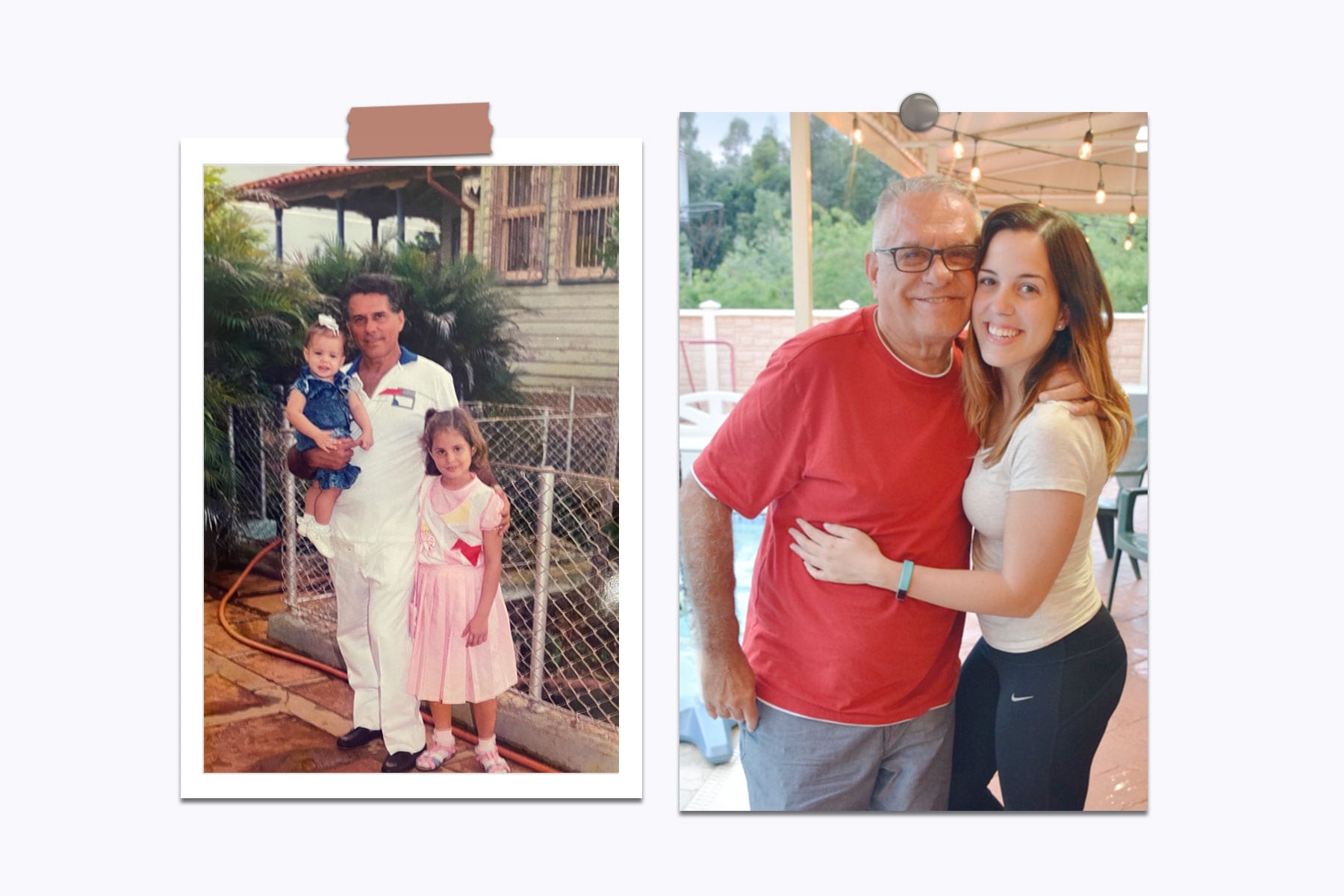
When I hear about trauma, I think about all of them, and sometimes, I think about me.
Every time a source mentioned a coronavirus loss to me after Abuelo died, I hesitated wondering if I should tell them that I wasn’t just sorry, that I understood. Would it feel to them like I was using my own life to help them open up as a source? Or would it come off as I intended it: an opportunity to take this vast isolation we each felt in our individual losses and diminish it?
At grandpa’s service last month, my mom said in her eulogy that she refused to believe Abuelo was “another number in this cruel statistic.” I had struggled before to understand the magnitude of more than 500,000 deaths. I don’t need to anymore — I just need to think of one.
Abuelo would have turned 80 on March 12, one day after the one-year anniversary of COVID-19 being declared a pandemic. Two weeks after he went into the hospital, public health officials showed up at the senior apartment complex where he’d lived and gave everyone their first vaccine shots.
I look ahead now at the road to vaccination, at the photos of people’s families getting their shots, and think about the opportunity we so narrowly missed. Writing about it will both be a burden and a responsibility that I gladly bear on Abuelo’s behalf, because I won’t look at their stories as statistics anymore, but as someone who understands the gift that is receiving a vaccination, the pain of missing out on one and the responsibility for the workers administering them.
Since January 15, I have thought often about how the staff that stood by us when Abuelo died could stand to witness death every day. I didn’t understand it until I silently cried while conducting an interview about coronavirus. I didn’t understand it until I read this essay to my husband — who works with the sick and dying on a near daily basis — and saw him cry when I got to the part about not recognizing Abuelo’s changed face in the ICU.
We never see them change, he said. We don’t know what they looked like before.
Grief stays with you, but it also arms you. It is power, in a way. Once you go through it, you have a little more room in your heart for the pain others feel.
After this year, we all understand that a little better.
